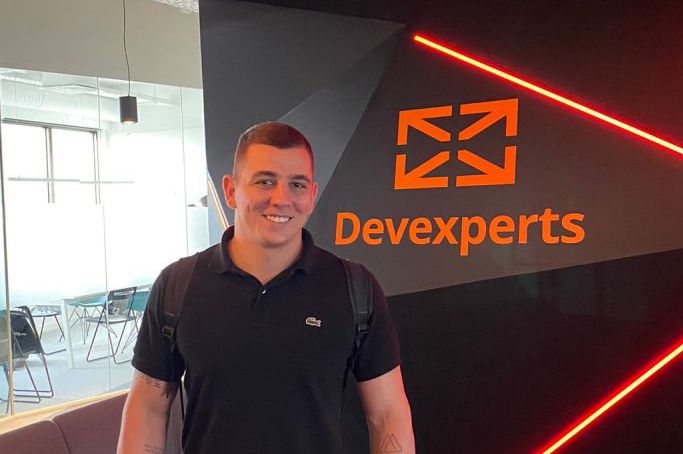Tech Support across the Globe: Interview with Luis Garcez
As a rule, the IT community concentrates on development, architecture, and products, and some crucial topics and figures remain hidden behind the scenes. Today, we would like to give a deserved shout-out to the tech support engineer of dxFeed and our Brand Ambassador Luis Garcez. As a man of Brazilian origin, he will disclose what it feels like to be an expat in Portugal and explain how to effectively operate in a distributed transnational company.

What do you do as a tech support engineer?
I am responsible for handling all client issues from the moment they come up until they are solved. I receive client requests, interpret them, and pass them on to developers, establishing a communication bridge. These requests can be about anything, from products to documentation. So, we must be ready for anything and look for ways to solve problems and satisfy client requests in the best way possible.
Why have you decided to choose this career path?
This field came to me. I studied accounting at university when I got my first tech support job. Eventually, I liked it so much that I decided to stick with it. I couldn’t imagine becoming a tech support engineer back then, but life gave me this opportunity, and I took advantage of it. I have still finished my degree, despite not having done much with it, but I’m thankful for the skills it gave me. Now I understand the business and the clients in a way I wouldn’t have without it.
Tell us about your impressions of working in an international company.
I’m from Brazil and have recently relocated to Portugal. I worked as a tech support engineer in my country for four years, but this was my first time working in an international company with a distributed team.
When the pandemic started, companies had to learn how to work from home, so we got used to being away from our peers, which prepared me for it.
Back home, all my teammates were Brazilian. We had the same backgrounds and spoke the same language, even though clients could be from around the world. The Devexperts team is international, so you can have people from many countries on your team. This is why good English is crucial for working with both clients and colleagues.
Now I have a chance to constantly be in contact with different countries and cultures and get to know various habits, which is nice. For an immigrant, it can also be challenging, though. Working away from my team means I don’t have the chance to bond with them. If one wants to feel connected, the distance makes it hard to do.
Luckily, the company holds many workshops and events, immensely contributing to my adaptation. I get to meet and make friends with people from other departments in my local office.
What is the most challenging part of your job, and what do you appreciate the most in it?
The main challenge is maintaining good communication with clients in comprehensible “non-technical” language, I believe. As a tech support engineer, I must create a balanced bridge between the developers’ code and the client. I translate code into understandable words for people without any technical knowledge. Doing this in Brazilian Portuguese, which is my mother tongue, can be hard sometimes. But it’s even more complicated in English, a foreign language for me. These challenges encourage me to develop my language skills and adaptability. I’ve become extra-flexible and a pro at problem solving, which is helpful at work and in life.

My newly-developed skills and the fact that I can work from home while building a solid career are my favorite things about working in tech support. I appreciate that Devexperts allows hybrid working mode because I get to avoid commuting, which gives me more time for my hobbies and loved ones.
Which skills are must-haves for a successful tech support engineer?
The number-one skill is being a sociable person. As a tech support engineer, you constantly contact the customer and the developers, so you can’t be shy or lack conversation skills. Actually, you should have all the qualities required for customer service, like emotional intelligence and patience, which are very important.
I’m not sure it’s a skill, but you should remember that clients usually aren’t as tech-savvy as you are. So, you must know when to switch from the programmer’s language to English and become comprehensible and human.
Anyone who wants to be successful in the field should also be a tech enthusiast and follow the latest tech updates and trends. You don’t have to be a pro at coding and know every programming language, but it doesn’t hurt to be informed about it. The more languages you have up your sleeve, the better.
What is your advice for someone looking to start a career in tech support?
This one isn’t exclusive to tech support: you should be resilient. You will face new problems to fix daily, and sometimes things won’t go as planned. Everyone has bad days, but if you’re resilient, there’s nothing you can’t do. If you come across a problem you can’t fix, ask for help or take a break to get back to it later. This rule works for non-professional life as well.
My last piece of advice is to constantly look for knowledge. You don’t need a technical background to learn how to be a technical support engineer. I studied accounting at university but took some courses as a tech enthusiast, kept updated with trends, learned the basics of coding, and now I’m here. You can do it, too.
Luis is a bright example of how one can start an IT career with no technical background. The Devexperts team is glad to contribute to his hands-on learning and career growth. If you are still thinking of entering the industry and not sure which path to follow, check out our open positions for Junior Specialists. Maybe your dream job is just one click away!